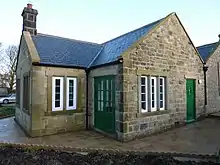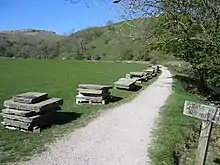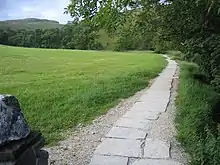Yorkstone
Yorkstone or York stone is a variety of sandstone, specifically from quarries in Yorkshire that have been worked since the middle ages.[1] Yorkstone is a tight grained, Carboniferous sedimentary rock. The stone consists of quartz, mica, feldspar, clay and iron oxides.
.jpg.webp)



The ratio of quartz to mica varies considerably. The stone can be split along mica-rich layers: it has a slaty cleavage and may therefore be called sandstone slate.[2] Formerly riven (split with a chisel along the bedding planes between the sedimentary layers), it is now also often sawn. It is used for flagstones and for building walls.[3][4]
Known for its hard-wearing and durable qualities, Yorkstone has been used in a wide array of building, construction and landscaping applications around the world for many years. In Yorkshire, split stones called thackstone (Scots thack, English thatch) were employed as roofing. The traditional London paving stone has been cut and pressed from quarries in Holmfirth, West Yorkshire. Yorkshire Stone is most commonly used for paving and garden walls, but it is also a popular choice for new builds as well as home extensions and conversions due to its durability to harsh weather conditions.[5]
The colour of Yorkstone depends on the minerals within its makeup and differs throughout the quarries from which it is mined. It also depends on the age of the stone and turns darker with weathering. Reused Yorkstone paving, salvaged from demolished sites, is valued for its naturally weathered surfaces. Reclaimed Yorkshire stone is popular for its colouring and for environmentally friendly builds.
Yorkstone often shows features such as laminations with cross bedding, and rusty Liesegang bands.[6]
References
- Gould, Kate (29 February 2012). "Designing small gardens: choosing stones". The Guardian. Retrieved 9 April 2014.
- Blumenbach, Johann Friedrich; Gore, Richard Thomas. A manual of the elements of natural history [electronic resource] (PDF). p. 360.
The true Sandstone Slate has commonly intermixed with it Mica, by which it is also generally traversed on its slaty fracture, as in the English Yorkstone, Bremingstone, &c. The proportion of Quartz to Mica, however, varies considerably as well with regard to the quantity as to the distribution.
- Articles apparently produced by Dermot Kennedy at http://www.cbstonesales.co.uk/, and also published in 2011 on Ezinearticles.com: "What is Yorkstone?"., "Making Sawn Yorkstone Paving"., "Making Riven Yorkstone Paving". "About Yorkstone Walling".
- "Building Stones 3 – Sedimentary rocks: How do the sedimentary rocks used for building stones differ?" (PDF). Earthlearningidea.
- "About Abacus Stone Sales | Leading Supplier of New and Reclaimed Yorkshire Stone". Abacus Stone Sales. Retrieved 17 September 2020.
- Siddall, Ruth; Kirk, Wendy. "The Urban Geology of UCL and the University of London's Bloomsbury Campus" (PDF). Urban Geology in London. University of London.